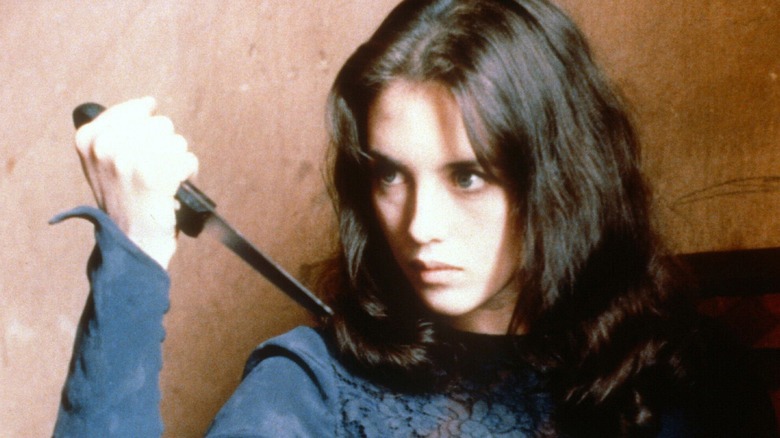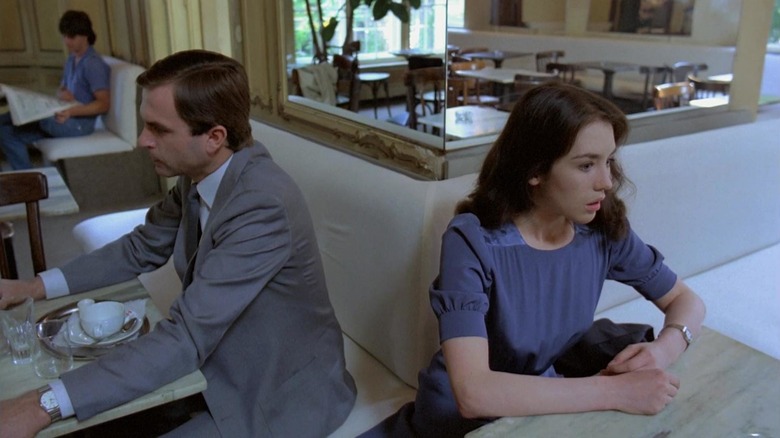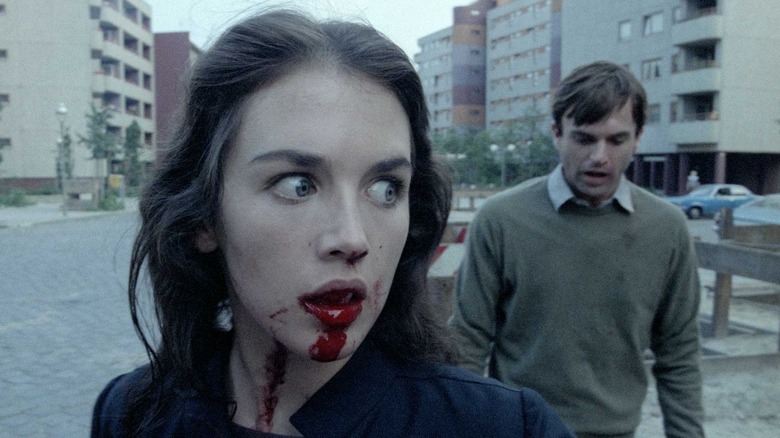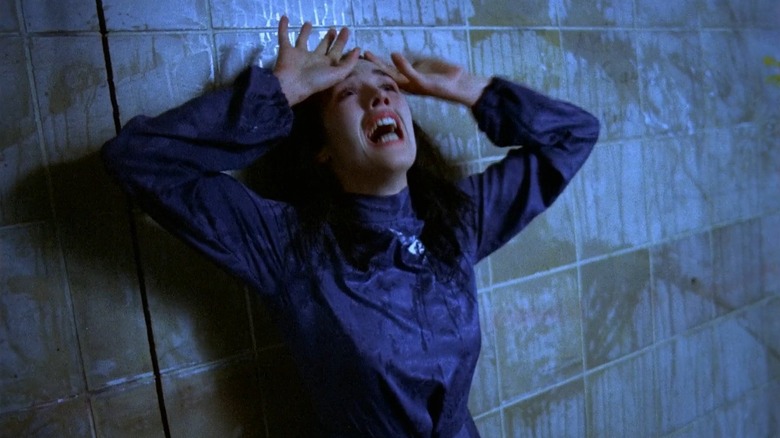How Possession Changed Isabelle Adjani Forever
Some of the most indelible performances in cinema seem to come from a place beyond acting. One of the greatest ever committed to film was from Renée Maria Falconetti in Carl Theodor Dreyer's "The Passion of Joan of Arc," which gives us an unbearable intimacy with the young martyr as she faces her cruel inquisitors. For all the director's severe stylistic choices, it is Falconetti's raw emotion that lingers the most. To look upon her face at a distance of almost a century, her intensity is so vital that it gives the sense that she is still alive and suffering in the same room as you. The screen ceases to exist.
I was reminded of Falconetti's remarkable presence when I first saw Isabelle Adjani in "Possession," although on face value their performances are wildly different. While Falconetti seems to draw from a deep well of personal and spiritual anguish, Adjani is more like a sorceress conjuring up a maelstrom of malevolent psychic energy.
In researching this piece, I discovered that there may be more of a connection between the two actors than I first thought; while the incredible performances are clearly down to immense talent on the part of Falconetti and Adjani, we also have to consider the impact of the auteurs behind the camera. Falconetti never made another film, while Adjani was deeply troubled by the final cut and the methods of Andrzej Zulawski, the director who pored his own personal circumstances into his bizarre tale of divorce, sexual deviance, and dopplegangers. He also reportedly put his actresses in a trance for certain scenes (via BFI).
"Possession" occupies a strange place in the history of horror, a cult item that sits in an oblique space between arthouse and grindhouse, a film that plays like "Marriage Story" by way of H.P. Lovecraft. Its notoriety has grown over the years, in part down to its reception on first release. In the U.K., it was caught up in the Video Nasty furore of the early '80s, while in the U.S. it was butchered by over 40 minutes ... that version of the film must have been a totally different experience.
There is also the enigma of its director, Andrzej Zulawski, the maverick Polish auteur born a year before his contemporary Krzysztof Kieślowski (The "Three Colors Trilogy") who never achieved the latter's widespread arthouse success, largely thanks to his uncompromising approach to his themes and storytelling.
Let's take a closer look at this brutal curio and how it affected its star, Isabelle Adjani...
So what happens in Possession?
Mark (Sam Neill) returns home to West Berlin from an espionage mission to find that his wife Anna (Adjani) wants a divorce, but won't tell him exactly why. Mark eventually agrees, giving up their apartment and custody of their young son, Bob. Totally distraught, Mark hits the bottle and regresses to a childlike state in a hotel room. When he recovers, he goes back to the apartment to find Bob alone and neglected. Anna's behavior has become extremely erratic, leaving the boy home alone while she is out sleeping with her lover, Heinrich (Heinz Bennent).
Mark refuses to leave his son with Anna and starts doing the school run, where he meets Helen (Adjani again), Anna's doppelgänger. After he violently confronts Heinrich and Anna attempts suicide, Mark hires a private eye to follow her. He traces her to a squat-like flat where she has a second lover, one that appears to be from another world...
Set against a bleak backdrop of Cold War tension in a divided Berlin, Zulawski creates a sense of squirming unease. For all the film's notorious gore provided by Carlos Rambaldi, the special effects wizard who would later give us a cute little brown alien who just wants to phone home, it is the visceral scenes of a marriage in terminal breakdown that are the most disturbing.
If it wasn't for the horror elements and the histrionic fireworks, "Possession" would be a far tougher watch than it actually is. Zulawski goads some truly bizarre performances from his cast to create a sense of spiraling madness. In that sense, his actors delivered in spades ... especially Adjani.
A toxic divorce fantasy ... with monsters
Director Andrzej Żuławski spoke of two sources of inspiration for "Possession." First, he saw Ingmar Bergman's "Scenes From A Marriage," and felt it lacked something ... namely, monsters. He also went through his own divorce from actress Malgorzata Braunek, during which he went home to find his son unattended and covered in jam, a moment that found its way into "Possession." For all the gruesome horror, it is a deeply personal break-up film, one that has been described as misogynistic revenge for Zulawski's own failed marriage. The director is often labeled as misogynist and/or misanthropic, and one of the troubling aspects of "Possession" is figuring out whether it is a film about misogyny, or just plain misogynistic.
"Possession" is set up to let the viewer draw their own conclusions, and I find it hard not to lean towards the latter. Although Adjani's performance is the most eye-catching, the story is told almost exclusively from Mark's perspective. This is a tale about a man who simply can't believe his wife doesn't want to be with him any more, and goes off the rails because she's off doing stuff beyond his control. He needs to possess her and Anna wanting to do her own thing is portrayed as hysterically bats*** crazy, culminating in that horrific moment in the subway when Adjani thrashes around oozing blood and other fluids onto the floor. It's a tour de force moment, but it is hard to see it as anything but Anna's punishment for her actions.
In its bizarre way, the conclusion is some form of apocalyptic reconciliation. Mark has found Helen, his wife's double and the opposite of Anna, a simpering blank and the chauvinist's ideal woman — beautiful, happy, subservient, and content to just sit around watching the kid. Anna has freed herself from Mark and birthed her new monstrous lover, but she can only reproduce his likeness. Despite all this, they still find their way back to each other in their bullet-ridden fate.
The finale is unremittingly bleak. Mark and Anna die reunited, leaving their terrified son in the hands of their sinister dopplegangers as bombs rain down outside.
The trend of toxic directors
In recent years, Shelley Duvall has spoken out about her traumatic experiences on "The Shining," regarding how Kubrick wanted to keep her in a constant state of anxiety and pushing her through a grueling amount of takes (via The Mirror). This culminated in a Guinness World Record of 127 takes in the scene where she is swinging a baseball bat at Jack Nicholson, genuinely looking on the verge of exhaustion.
This brings us to the long and troubling history of male directors abusing female stars to supposedly get the desired performance out of them.
All the way back in the '20s when Dreyer shot "The Passion of Joan of Arc," rumors emerged that he treated Falconetti very harshly to get her to the right place emotionally for her legendary performance. As Roger Ebert tells it:
For Falconetti, the performance was an ordeal. Legends from the set tell of Dreyer forcing her to kneel painfully on stone and then wipe all expression from her face–so that the viewer would read suppressed or inner pain. He filmed the same shots again and again, hoping that in the editing room he could find exactly the right nuance in her facial expression.
This pattern of abuse in the guise of auteurship is repeated again and again, from Hitchcock pelting Tippi Hedren with live birds in "The Birds" to Tarantino spitting in Uma Thurman's face and choking her with a chain in "Kill Bill" (via Insider).
Adjani reportedly suffered from post-traumatic stress after her performance in "Possession," which wouldn't be a surprise; she is frighteningly uninhibited in that subway scene, her emotions as naked as Falconetti's decades earlier. At what cost? Zulawski told the story of Adjani's alleged suicide attempt on numerous occasions, taking a rather belittling tone on the subject. As he said on the DVD commentary:
"When she saw the film, after, she committed suicide because she never wanted to see the dailies, so she really didn't know how do we look at her, and she committed suicide, but being Isabelle Adjani... and you must understand, in Europe, Isabelle Adjani is a diva, she's a big thing... and she went to the bathroom and she cut her wrists with a G2 machine [razor] which cuts you half a millimeter of skin and not much deeper..."
As for Zulawski, Adjani stated that he was manipulative and abusive on set, supposedly to get the right level of crazy from his actors. Adjani felt that the film was "psychological pornography" that delved much further into the soul than was appropriate. Years later, she said that she would never allow herself to be insulted by a director like that again. In an interview, she said:
"Possession is only the type of film you can do when you are young. [Zulawski] is a director that makes you sink into his world of darkness and his demons. It is okay when you are young, because you are excited to go there. His movies are very special, but they totally focus on women, as if they are lilies. It was quite an amazing film to do, but I got bruised, inside out. It was exciting to do. It was no bones broken, but it was like, 'How or why did I do that?' I don't think any other actress ever did two films with him."



